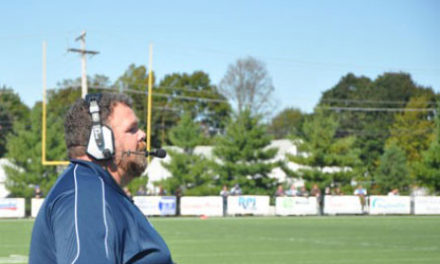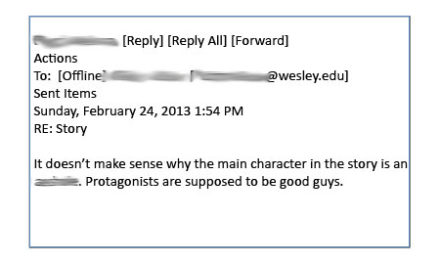
Brittany Wilson || Kristen Griffith / The Whetstone
By Brittany Wilson, The Whetstone
The first time I talked to Annie Kendzior we were nearly 1,500 miles apart, connected by only a phone line and a will to tell the truth.
Her father had contacted The Whetstone only a few weeks before; his story passionately tumbled out of his mouth and into a frenzied formation— the words hurriedly somersaulting through the phone and into my notebook, along with Annie’s contact information.
Before that day I had never even heard her name. In the days that followed I couldn’t get it out of my mind.
Kendzior was a junior in high school when she was accepted into the US Naval Academy. She had an impressive GPA, was a nationally-ranked soccer player and the Academy’s No. 1 draft pick over any other athlete that year. She could have gone to any school she wanted to. She had been accepted into more than thirty. But she chose the Naval Academy. She wanted to serve her country.
Two months into her first semester, Kendzior was invited to a lacrosse team house party. She went, she drank, she blacked out—she woke up with an upperclassman on top of her.
Terrified that she might get kicked out for pointing fingers, she kept quiet.
A few months later— different time, different people, same scenario—it happened again, this time though, she was drugged.
Still too afraid to speak up, Kendzior kept quiet.
Keeping that kind of trauma bottled up inside for so long, reliving it over and over again every day, and being forced to work side by side with her attackers, took its toll on her. She was 19, 20, 21 years old and was falling apart.
When she mustered up the courage to speak, Kendzior was kicked out.
It’s been about six years now since Kendzior was forced to leave the Naval Academy. I sat in my car— her voice echoing through my speakers—and listened intently as her story unfolded, bridging the distance between us.
“I didn’t do anything wrong,” she said. “I was raped.”
That statement stuck with me long after the call ended.
Later in the week, still struggling to process it all in my mind, I told two different friends (both men) her story. I was shocked by the differences in their reactions.
The first reacted similarly to how I imagine Donald Trump would respond.
“Sounds to me like she needs to take responsibility for her own actions,” he said. “She made the choice to drink underage and she paid the consequences. What did she expect to happen? Drunk girls make bad decisions and then make up excuses like rape to try to cover them up.”
In other words, Kendzior made a poor decision and she deserved everything that happened.
The second friend sat quietly for a moment before he spoke, mulling it over and carefully choosing his words before he finally breathed them aloud.
“Was it wrong for her to drink underage? Sure,” he said. “But that’s not something she would wake up from and be psychologically scarred by. She wouldn’t have been kicked out of school for it or forced to forfeit her dreams, her career. All of those things happened while she was unconscious as a result of someone else’s awful decision—someone who never had to pay any consequences at all. So two people made poor decisions that night: one of them paid severely, the other wasn’t punished at all.”
In other words, Kendzior got raped. Kendzior had severe psychological trauma. So Kendzior was forced to leave. She didn’t get to graduate. She didn’t get to serve her country. While her attackers got to carry on unscathed to live out her dream.
The 2015 Wesley College Annual Campus Security Report states that “sexual misconduct includes sexual activity with a person who is mentally defective, mentally incapacitated, or physically helpless, including those individuals under the influence of alcohol and/or drugs, and who are therefore legally incompetent to give consent.”
In other words, drunkenness does not equal consent; unconsciousness is not a free pass.
People are people, no matter the color of their skin, their gender, their mental state or their sexual orientation. People are people, no matter how many drinks they have had, what they are wearing, how skewed their judgment, or how delayed their reaction time is.
A person is a person, no matter what she has been through, what her GPA is, what secrets she’s locked up inside, or what psychological disorders she has been diagnosed with. We all have the same rights as human beings to be treated with respect, decency and empathy.
Punishing the victim of a rape crime instead of the rapist is like
- Showing up to a crime scene and pulling a gun on the wounded man rather than his attacker.
- Robbing a man who was just pickpocketed rather than chasing down the thief.
- Declaring war on a defenseless country rather than standing up to the real threat.
- Forcing Annie Kendzior to leave the Naval Academy only a few months before her graduation because she suffers from PTSD after being raped— not once, but two times—as a student, by a student.
Somewhere 1,500 miles away, Kendzior sat on the other side of the phone, telling her story, voicing her concern for the well-being of every woman on Wesley College’s campus.
“My biggest fear is that something like this will happen to another woman,” she said. “You can’t just brush it under the rug and say ‘oh everything’s fine, everything’s good.’ It shouldn’t be hush-hush. A school shouldn’t be concerned only with preserving their image, and neither should its president. A more proactive approach helps the victim feel more support. I got told to ‘shut up’ and ‘you’re not even a part of this school anymore.’”




